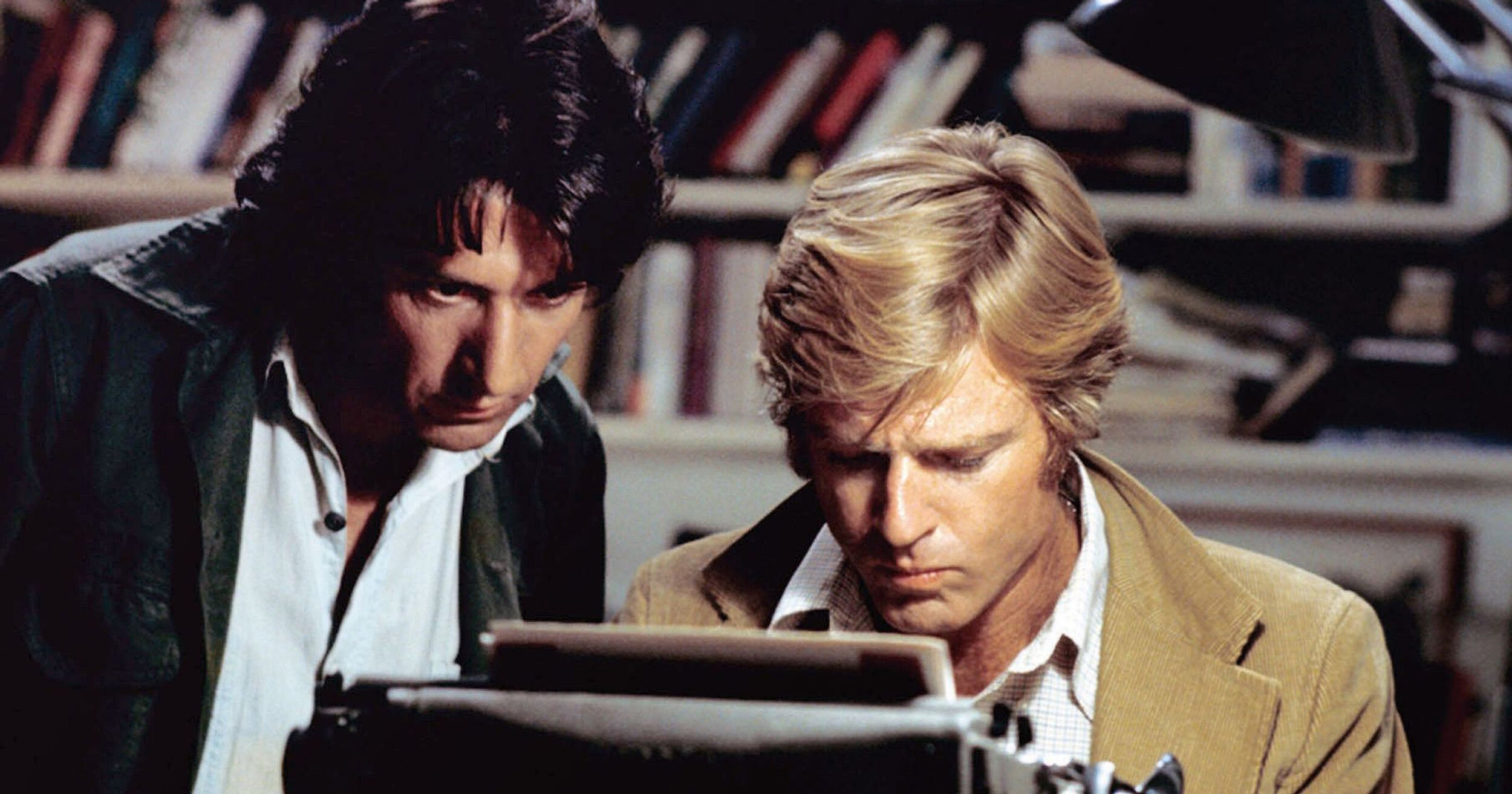Woodward & Bernstein and the Myth of the Media Heroes
We like to think that the crusaders of the free press will always save us from the dragons that try to kill democracy. This was the Watergate myth that inspired so many students in my generation to become journalists. We tried our best (some of us) but as I near 70, American democracy seems more in peril than ever. Mark Dowie, whom I had the pleasure of working with as a fellow Mother Jones editor in the 1980s, is one of the few to make my best modern muckrakers list. Mark broke stories about the exploding Ford Pinto, the dangerous contraceptive devices foisted on women and many other big exposes about corporate malice. He has now authored a provocative history of investigative journalism titled When Truth Mattered, and I’m publishing an excerpt from the forthcoming book below.
In it, Mark examines the hollowness of the persistent Watergate myth. Even though they helped inspire me to become a journalist, I came to dismiss Bob Woodward and Carl Bernstein as captives of the Beltway culture — more adept at catching leaks from aggrieved government officials than exposing the true mechanisms of power in America. Read Mark Dowie’s viewpoint here:
There is no better place to start the rebirth of investigative reporting than with Watergate, regarded variously as “the most significant work of political reporting in history” .... “the standard for modern investigative journalism”... “the single most spectacular act of serious journalism of the 20th century” .... "maybe the single greatest reporting effort of all time” .... “a milestone” ... “a triumph.” But because there is so much detailed media history about Watergate, it can also be a case study used to examine the true impact and consequence of a single investigative effort.
The convenient and oft repeated trope on the Watergate investigation is that two investigative reporters, with the support of a brilliant editor and a courageous publisher, changed the course of American history by ending the political career of Richard Nixon.
In his book, Watergate in American Memory, Columbia University Professor of Journalism Michael Schudson describes "a mythology of the press in Watergate [that] developed into a significant national myth, a story that independently carries on a memory of Watergate even as details about what Nixon did or did not do fade away. At its broadest, the myth of journalism in Watergate asserts that two young Washington Post reporters At its broadest, the myth of journalism in Watergate asserts that two young Washington Post reporters brought down the president of the United States. This is the myth of David and Goliath, of powerless individuals overturning an institution of overwhelming might. It is high noon in Washington, with two white-hatted young reporters at one end of the street and the black-hatted president at the other, protected by his minions. And the good guys win. The press, truth its only weapon, saves the day.”
Historian Stanley Kutler, author of The Wars of Watergate agrees. There is mythology at work here. “As more documentary materials are released," he writes, "the media's role in uncovering Watergate diminishes in scope and importance. Television and newspapers publicized the story and, perhaps, even encouraged more diligent investigation. But it is clear that as Watergate unfolded from 1972 to 1974, media revelations of crimes and political misdeeds repeated what was already known to properly constituted investigative authorities. In short, carefully timed leaks, not media investigations, provided the first news of Watergate.” It was more like what Columbia University Professor Shiela Coronel calls “leak journalism” than traditional investigative reporting.
"At best," according to investigative historian and Harvard political science professor Edward Jay Epstein, "Woodward and Bernstein, only leaked elements of the prosecutor's case to the public" — details that would have surfaced in a day or two. “Re-leaked” might be a better word. It was the FBI, Epstein argues, “not reporters, that linked the burglars to the White House and traced their money to the Nixon campaign. Reporters covering the case for every paper that covered Watergate systematically ignored or minimized the work of law enforcement officials to focus on those parts of the story that were leaked to them," Epstein charged.
Watergate prosecutor Seymour Glanzer seems to agree with that assessment. ”Woodward and Bernstein followed in our wake,” he says.”The idea that they were this great investigative team was a bunch of baloney."
That didn’t stop Simon and Schuster from sexing up the second draft of All The President’s Men, Woodward and Bernstein’s personal account of their investigation, to make the authors more heroic, their plot more David-and-Goliath, and give a nickname to “Deep Throat” that never existed before. Nor did it stop Warner Brothers from hyping their the movie of the same name, or casting two of the hottest, handsomest men in Hollywood, as "the story of the two young reporters who cracked the Watergate conspiracy...[and] solved the greatest detective story in American history. At times, it looked as if it might cost them their jobs, their reputations, perhaps even their lives.” The myth lived on.
Bob Woodward’s opinion on the matter is modest and should really close the case. “To say that the press brought down Nixon, that's horseshit," he says. "The press always plays a role, whether by being passive or by being aggressive, but it's a mistake to overemphasize the role of media in any outcome.” Carl Bernstein concurs, acknowledging that the "role of Bob and myself has been mythologized .... In great events people look for villains and heroes.” Both authors and their various hagiographers are aware, of course, that Richard Nixon was re-elected in 1974, by a landslide, after the story broke, and was forced out of office, not by their expose, but by congressional investigations that followed it by a year or more.
But heroes Woodward and Bernstein will remain for generations. Despite the debate over the true role their work played in the outcome, it was their prodding of politicians and federal agents that kept the government’s investigation alive, and that is what lead to the ultimate demise of Richard Nixon, a man who died with very good reasons to despise the media, whatever its true role in his demise.
"Who cares if journalism in Watergate was generally lazy?” asks Michael Schudson, “or if Judge Sirica or some FBI agents were as vital to Nixon's undoing as were Woodward and Bernstein? It does not matter, because the Watergate media myth is sustaining. It survives to a large extent impervious to critique. It offers journalism a charter, an inspiration, a reason for being large enough to justify the constitutional protections that journalism enjoys ... not to tell us who we are but what we may have been once, what we might again become, what we would be like ‘if.’"
Northwestern journalism professor Jon Marshall contends that “the full extent of the White House’s criminal conspiracy probably never would have been exposed without the Post’s efforts” and the patient persistence of Woodward and Bernstein, who continued chasing Watergate in spite of skepticism elsewhere in the press, including some within their own newsroom. More over, Marshall writes, “their stories strongly influenced the people who took the actions that eventually led to Nixon’s resignation and the prosecution of his top aides.”
“Watergate solidified the critical importance of investigative reporting," according to former Investigative Reporters and Editors Executive Director Brant Houston. “All the President's Men popularized and humanized investigative reporting," Houston observes, “and provided the inspiration for thousands of young people to become journalists who wanted to make a difference."
Woodward and Bernstein shared a Pulitzer Prize in 1973. By 1974 investigative reporting was back in full swing. That year four Pulitzer’s were awarded to investigative stories. Time declared it “The Year of the Muckrakers.”
In retrospect the ultimate value of the Watergate story was not in the questionable assertion that it brought down a president, but that the lasting image of two hard working, deeply committed reporters working tirelessly for weeks to produce an insightful expo- sure of national power, inspired an entire generation of young men and women around the world to become investigative journalists. More than half the investigative reporters I interviewed for this book attribute Watergate as the story that prompted them to stop doing whatever they were doing and become muckrakers. Say what you want about the reporters and their role in the project, the story itself definitely inspired what has since become known as the “Watergate Era” of investigative reporting.
Watergate: The movie myth

